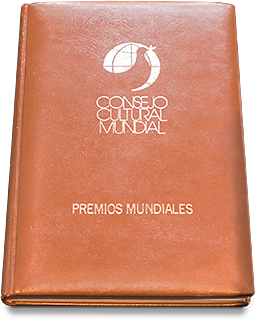
 Albert Einstein World Award of Science 2005
Albert Einstein World Award of Science 2005
Field of Research: Life Sciences
Date: 12 November 2005
Place of Ceremony: Fernando Soler City Theatre
Host Institution: Agricultural Autonomous University of Antonio Narro
Host Country: Saltillo, México
SALTILLO, COAHUILA, MEXICO. NOVEMBER 2005. The World Cultural Council presented the 2005 Albert Einstein World Award of Science to Prof. John J. Hopfield, Department of Molecular Biology, Princeton University, USA. The Award Ceremony took place at Saltillo, Coahuila, México, with the host of the Universidad Autónoma Agraria Antonio Narro.
The Albert Einstein World Award of Science has been established as a means of recognition and as an incentive to scientific and technological research and development. It takes into special consideration research that has brought true benefit and wellbeing to humankind.
This recognition made by the members of the Interdisciplinary Committee of the World Cultural Council to Prof. John J. Hopfield for his valuable contributions to all three of the major disciplines of modern science: physics, chemistry and biology and for his faculty to cross the interdisciplinary boundaries to discover new questions and propose answers that uncover the conceptual structure behind the experimental facts.
Prof. John J. Hopfield today is considered the leading theoretician of biology, both in terms of accomplishment and influence. His ability to think broadly as well as deeply about science is a characteristic shared by very few scientists in modern times.
His outstanding contribution to physics was a series of brilliant joint papers with D.G. Thomas that formed the basis of understanding of the optical spectroscopy of II-VI semiconductors in the late 1950’s. He received in 1958 his PhD in Physics from Cornell University. Between the years 1964 to 1980 he has served as Professor of Physics, Princeton University; from 1980 to 1997 he has been Professor of Chemistry and Biology, California Institute of Technology, currently he is Professor, Department of Molecular Biology, Princeton University
In 1969 Prof. Hopfield received the Oliver E. Buckley Prize for his research on the emission and absorption of light by semiconductors, a topic of central importance for understanding how light-emitting diodes function.
He is most widely known for his invention -in 1982- of the associative neural network, the Hopfield model, that demonstrates how qualitatively different computation in our brain and in a computer can be. His breakthrough contribution to neurobiology is based upon his model of neural processing that offers keen insights into the vastly different mechanisms that the human brain and the digital computer use to compute information and make decisions.
Prof. John J. Hopfield’s honors include the John and Catherine T. MacArthur Award; the Neural Network Pioneer Award, IEEE; the 2001 Dirac Medal and Prize, International Center for Theoretical Physics, Trieste and in 2002 the Pender Award, Moore School of Engineering, University of Pennsylvania among others.
The importance of his work is reflected in the use of “Hopfield Networks” to denote a type of recurrent neural network that can function as associative memory. Accordingly to his colleagues his contributions have brought the field of neural networks to maturity, allowing it to flourish and move forward in directions that are clearly marked by his influence.


